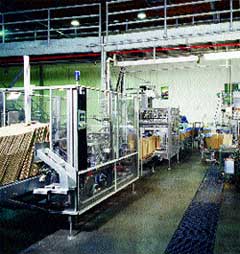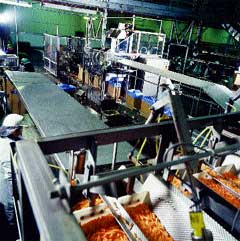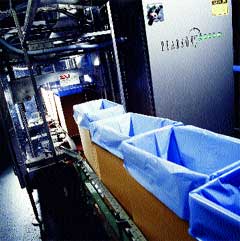Bulk casing line keeps its cool
January 29, 2014

One of America's leading suppliers of potato, vegetable and fruit products for the foodservice industry, J.R. Simplot, headquartered in Boise, ID, is an agribusiness that prides itself on its produce, among many other products. One of those products is frozen french fries. Simplot began supplying McDonald's with french fries in the mid-'60s, and has remained the major fresh fry supplier to Big Mac ever since.
Focusing on quality and innovative products, the company
|
Case blanks enter the case erector on the far left and are set up and bottom-sealed before they enter the bag inserter, right. |
offers the Roast Works line of flame-roasted and seasoned individually quick-frozen vegetables and fruit as well as blends of vegetables and pasta products, processed at its plant in Quincy, WA, to allow customers to develop new and attractive menus. One of the largest vegetable plants in the U.S., the impressive 225,000-sq-ft Quincy plant has a frozen food component that freezes and packs roughly 400 million lb of product each year–veggies grown in the Northwest, including green peas, snap sugar peas, corn, carrots, lima beans, rice and pasta.
 To keep up with its more than 500 stockkeeping units for foodservice, organic, export and retail customers, Simplot in mid-August installed a new bulk case-packing line with a Pearson Packaging Systems Model R235 case erector with bottom sealing to erect knocked-down corrugated cases and a Model B240 film bag inserter, and added existing Powell weigh scales to the line.
To keep up with its more than 500 stockkeeping units for foodservice, organic, export and retail customers, Simplot in mid-August installed a new bulk case-packing line with a Pearson Packaging Systems Model R235 case erector with bottom sealing to erect knocked-down corrugated cases and a Model B240 film bag inserter, and added existing Powell weigh scales to the line.
The Pearson equipment was supplied through Garrett Packaging Systems, which along with Pearson, says Simplot maintenance manager Bruce Miller, wanted to make this installation work. "The packaging line project was accomplished, from front to back, in three months," he says. "There was incredible cooperation and teamwork, or we would have never made the mid-August startup."
 Simplot had an earlier bag-insertion system at the plant, so was experienced operating such equipment, but says it decided to investigate other, faster equipment because the initial machinery only handled a limited number of bags. Changeovers were lengthy as well, says Mike Pirkey, packaging production manager. "We decided to insert the bags into the case by hand instead until we could find something that was faster and more reliable," he says. "Automating this [process] saved thirty to forty percent in labor, and we now insert bags into the cases about four-times faster."
Simplot had an earlier bag-insertion system at the plant, so was experienced operating such equipment, but says it decided to investigate other, faster equipment because the initial machinery only handled a limited number of bags. Changeovers were lengthy as well, says Mike Pirkey, packaging production manager. "We decided to insert the bags into the case by hand instead until we could find something that was faster and more reliable," he says. "Automating this [process] saved thirty to forty percent in labor, and we now insert bags into the cases about four-times faster."
Designed to erect knocked-down case blanks at rates up to 24/min, the Model R235 case erector was suitable for the 20- to 55-lb-capacity shipping cases used on the bulk line. "The majority of our customers want the convenience of a bulk package that contains twenty to fifty-five pounds of frozen product," Pirkey explains. "This size is easy to use in foodservice applications and is equally useful for those customers who include our frozen vegetables or fruit as a component of their final products, such as in a prepared meal. We have both foreign and domestic customers, including those who repack small portions, so it's important for us to offer product in this format."
Flexible and quick
One alternative, Pirkey says, is to use bulk totes that can hold up to 1,500 lb, but many customers don't have the capabilities to handle such containers. The new casing line instead runs assorted, individually quick-frozen vegetables, vegetable/pasta blends and some fruit items in a room refrigerated to 38 to 40 deg F. Along with the R235 case erector and a B240 bag inserter, the line includes an existing set of Powell pneumatic weigh scales that have been outfitted with new product "dumping" hoppers from Commercial Equipment.
|
On the other end of the room, frozen carrot sticks move through the weigh scales to be deposited into bag-lined cases below. |
Compact and ruggedly designed, the case erector is suitable for a variety of corrugated case sizes and styles, sealing case bottoms with pressure-sensitive tape. The machine operates by mechanically transferring cases from a horizontal magazine hopper directly to a setup station, followed by a forming station.
Equipped with an Allen-Bradley SLC 5/03 programmable logic controller and an inventory control photoeye at its discharge, the B240 bag inserter uses a unique, patent-pending "parallel-motion" bag-opening technique. The parallel motion technique is said to increase both speed and reliability by overlapping the bag-opening and inserting steps, so that each step is executed more slowly than would be required if they were sequential. Pearson states that the servo-driven, parallel-motion feature speeds mandrel placement of bags, so that the step is faster and more positive than with other systems that rely on air to place bags. Both the erector and bag inserter were built with a corrosion-resistant finish that withstands the plant's cold-temperature vegetable-packing environment.
"We think the bag inserter, which uses almost a split-yoke device to open the bag, is an excellent system and so much faster than the former method," Pirkey says.
Simplot uses the system with 12 to 14 different case sizes representing 40 or 50 different vegetable and blend products in various weights and in bag thicknesses ranging from 2 to 3 mils. Simplot uses assorted types of polyethylene bags, many of which it obtains from Pliant, though Pirkey says it also uses nylon/PE laminates and multilayer laminates supplied by various sources. The majority of corrugated RSC cases (in several test weights) come from Longview Fibre.
A key requirement for the bulk line, Pirkey points out, was that the bag inserter be guaranteed to run a full 24 cases/min.
"Our scales are set to fill twenty-four cases per minute top end, so we needed all of the components in the line to support this speed," he tells PD. "Pearson was the only supplier that could guarantee this speed. Anything that runs slower would have created a bottleneck."
Another key Simplot objective was that the machinery be flexible and quick to change over, Pirkey says. "Changeover has to be done without tooling in five minutes. That's because we often run fifty-five to sixty different skus a week, and production runs are as short as twelve minutes. We make products to stock, but the stock turns over so rapidly, we have to respond quickly to customer demands. Machines have to be ready," he explains.
Incorporating an Allen-Bradley Micrologic 1500 PLC, the R235 case erector has a quick-adjust case hopper that stands 29 in. from the floor and is 28.5 in. wide, so most lifting and bending motions are reduced during case loading.
|
Cases exit the bag inserter with PE liners cuffed. Next, the cases travel overhead to be inspected and later sealed and palletized. |
Vacuum cups mounted on a rotating mechanical arm grasp a case from the magazine and rotate it 90 deg to place it into the forming station. Top and bottom vacuum cups engage the blank, and a mechanical setup arm then erects the case in the direction of flow. The erector also has low-tape and no-tape sensing.
Line 6–the bulk line–is one of 11 operating in the massive plant. Two operators run the line. During production, case blanks stacked on-edge in the R235's 4-ft-long horizontal magazine are erected as a set of rotating actuators close both leading and trailing minor flaps, while major flaps are plowed closed, and the case is transferred to the taper. The case's major flaps are taped by a Dekka 22 High-Speed Soft Touch (C) Clip p-s taping system before the case exits the machine and is tipped, landing right-side-up, on a conveyor.
Cases then travel only 6 ft to the bag inserter, which uses a mandrel to quickly and smoothly open and insert the bags, as the parallel-motion opening device activates, and the preperforated bags proceed into the bag-opening station. A vertically arranged vacuum plenum with an open-ended slot on the top allows a pucker to occur on the flat bags, allowing them to separate, which preconditions them prior to opening to prevent bags from blocking through the system. This plenum secures the bag, and a carriage opens the bag above the waiting case.
The mandrel travels downward into the bottom of the case as a cuffing mechanism with cuffing fingers moves outward to cuff the bag over the case and permits the mandrel to retract. The carriage closes to allow the vacuum plenum to secure the next bag, maximizing vacuum-establish time. When the mandrel is retracted, the case is released to transfer out of the loading station, and the process begins on the next bag.
Then, the bag-lined cases make a U-turn and heads toward the set of weigh scales. There, product is dumped from three large Commercial Equipment dumping hoppers (provided through Mountain Pacific Machinery) onto a flat vibratory conveyor where one line operator inspects the product for quality before it incline-conveys 15 ft to a mezzanine level and passes through a Thermo Goring Kerr metal detector and into the scales. The vegetables drop into the cases conveying below the scales.
At this point, the filled cases convey back down to the ground-floor level where the bag inside each case is uncuffed and closed by hand before the cases travel on another vibratory conveyor during which the loads settle, before the cases are top-sealed on a Simms case taper. Next, the filled, sealed cases incline again and exit the room to be automatically palletized, 50 to 90-plus cases per load, depending on customer requests, by a robotically assisted system from Columbia/Okura.
Double-digit growth
Earning top ratings for quality processing, operations and maintenance from '94 through '02 by accredited testing lab Silliker Laboratories, Simplot's Quincy plant strives for and achieves peak efficiency. Already, it has experienced incredible results from automating the bulk-packing operation on Line 6, Pirkey says.
Running three shifts a day, five days a week, the vegetable packing line has proven to be cost-efficient. "The equipment will probably pay for itself within a year," Pirkey states. Productivity is growing, he adds. "For the past three years we've averaged significant double-digit growth in packing capacity. We will be pushing everything to a maximum speed and soon hope to run this line at speeds between twenty-eight and thirty cases a minute. We are very pleased with the equipment."
More information is available:
Bag inserter, case former: Pearson Packaging Systems, 509/838-6226. Circle No. 238.
Casing equipment representative: Garrett Packaging Systems, Inc., 360/604-4282. Circle No. 239.
Weigh scales: Powell Systems, Inc., 330/759-9220. Circle No. 240.
Taping system: Dekka Industries, Inc., 604/270-0811. Circle No. 241.
Bags: Pliant Corp., 866/878-6188. Circle No. 242.
Cases: Longview Fibre Co., 360/425-1550. Circle No. 243.
Case taper: Simms Mfg. Co.,509/453-7690. Circle No. 244.
Commercial Equipment product dumpers: Mountain Pacific Machinery, 503/639-7635. Circle No. 245.
Metal detection: Thermo Goring Kerr,763/783-2500. Circle No. 246.
PLCs: Allen-Bradley, 414/382-2000. Circle No. 247.
Palletizer: Columbia/Okura L.L.C., 360/735-1952. Circle No. 248.
About the Author(s)
You May Also Like





